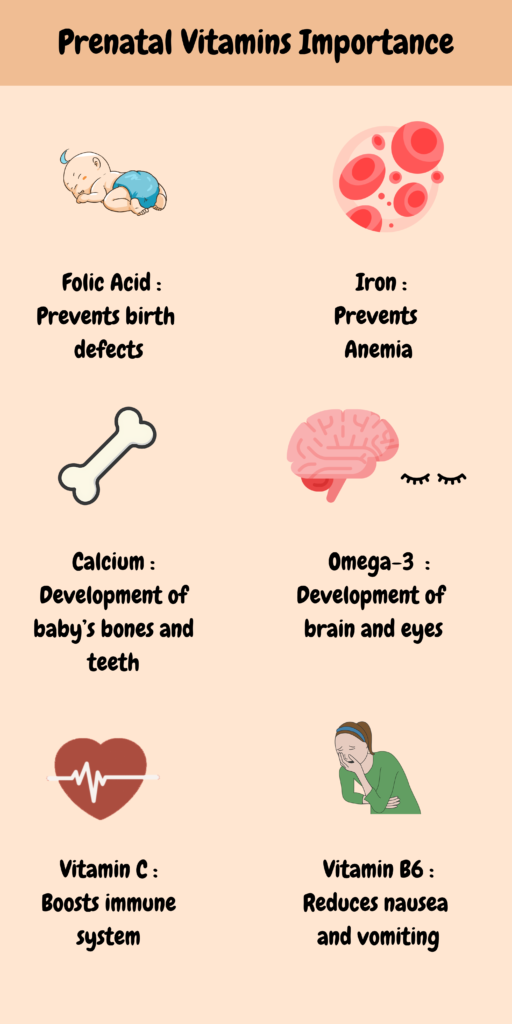Prenatal Vitamins
Prenatal vitamins are specially formulated supplements designed to support the nutritional needs of pregnant ladies and their developing babies. They typically contain essential nutrients such as folic acid, iron, calcium, and DHA, which play crucial roles in fetal development and maternal health. It’s generally recommended to start taking prenatal vitamins before conception and continue throughout pregnancy and breastfeeding to ensure both mother and baby receive adequate nutrition for optimal growth and development.
On this page
1. Prenatal Vitamins importance during Pregnancy
Prenatal vitamins are essential during pregnancy as they help fill nutritional gaps and support both maternal and fetal health. Some of the essential prenatal vitamins include:

- Folic Acid: Folic acid, is crucial during pregnancy. It helps prevent neural tube defects, which are serious birth defects of the brain and spine, if taken before conception and in the early stages of pregnancy. The recommended daily intake is typically 400 to 800 micrograms. Additionally, folic acid supports the formation of the placenta and helps with the production of red blood cells, reducing the risk of anemia in pregnant individuals. Ensuring adequate folic acid intake can lead to healthier pregnancy outcomes and contribute to the baby’s overall development. It’s often advised to start supplementation at least one month before conception and continue throughout the first trimester.
- Iron: Iron is a vital nutrient during pregnancy, as it supports the increased blood volume and helps prevent anemia, a condition that can lead to fatigue and complications for both the mother and baby. During pregnancy, the body requires about 27 milligrams of iron daily, significantly higher than the standard amount. Iron is essential for producing hemoglobin, which carries oxygen to both the mother and the developing fetus. Insufficient iron intake can result in low birth weight, premature delivery, and developmental delays. Pregnant individuals are often advised to include iron-rich foods like lean meats, beans, spinach, and fortified cereals in their diets, and may also need to take iron supplements to meet their needs, especially in the second and third trimesters.
- Calcium and Vitamin D: Calcium and vitamin D are essential nutrients during pregnancy, playing critical roles in both maternal and fetal health. Calcium is vital for the development of the baby’s bones and teeth, as well as for maintaining the mother’s bone density. Pregnant individuals need about 1,000 milligrams of calcium daily, with an increase to 1,300 milligrams for those under 18. Vitamin D aids in calcium absorption and is important for bone health and immune function. It also supports fetal development, including the growth of the skeleton. A deficiency in these nutrients can lead to complications such as preeclampsia, gestational diabetes, and an increased risk of osteoporosis later in life. Pregnant individuals are encouraged to obtain calcium and vitamin D through a balanced diet that includes dairy products, leafy greens, and fortified foods.
- Omega-3 fatty acids: Omega-3 fatty acids, particularly DHA, are crucial during pregnancy for both maternal and fetal health. They play a significant role in the development of the baby’s brain and eyes, and are linked to improved cognitive function and visual acuity in infants. Adequate intake of omega-3s may also reduce the risk of preterm birth and support maternal mood, potentially lowering the risk of postpartum depression. Pregnant individuals are encouraged to consume omega-3-rich foods such as fatty fish (like salmon and sardines), walnuts, flaxseeds, and algae-based supplements if needed. The recommended intake is around 200-300 milligrams of DHA per day. Ensuring sufficient omega-3 levels can contribute to healthier pregnancy outcomes and support the overall development of the baby.
Overall, prenatal vitamins contribute to a healthy pregnancy, reduce complications, and ensure that both the mother and baby receive the necessary nutrients for optimal growth and development.
2. When should you start taking Prenatal Vitamins?
It’s recommended to start taking prenatal vitamins at least one month before conception and continue throughout pregnancy and breastfeeding. This early start helps ensure that your body has adequate levels of essential nutrients, particularly folic acid, which is crucial for preventing neural tube defects. If you’re planning to conceive, taking prenatal vitamins can also support overall reproductive health. For those who are already pregnant, beginning prenatal vitamins as soon as you confirm your pregnancy is important for supporting both your health and the development of your baby. Always consult with a healthcare provider to start taking prenatal vitamins according to your body needs.
3. Benefits of taking Prenatal Vitamins when you’re not pregnant
Taking prenatal vitamins when not pregnant can offer several benefits, particularly for individuals planning to conceive or those in their reproductive years. Here are some potential advantages:
- Nutritional Support: Prenatal vitamins contain higher levels of key nutrients, such as folic acid, iron, and calcium, which can help address nutritional deficiencies.
- Folic Acid: The high folic acid content can help support healthy cell division and may reduce the risk of certain birth defects when conception occurs.
- Enhanced Energy: The iron in prenatal vitamins can help improve energy levels and reduce fatigue, particularly for those with heavy menstrual cycles or low iron levels.
- Bone Health: Calcium and vitamin D support bone health, which is beneficial for everyone, especially those at risk of osteoporosis.
- Hair and Skin Health: Some individuals find that the nutrients in prenatal vitamins promote healthy hair and skin, thanks to the additional vitamins and minerals.
- Overall Wellness: A comprehensive vitamin regimen can support overall health and wellness, helping to ensure that the body is well-prepared for pregnancy if it occurs.
While prenatal vitamins can be beneficial, it’s important to consult with a healthcare provider before starting any new supplement regimen.
4. Do Prenatal Vitamins have side effects?
Yes, prenatal vitamins can have side effects, though they vary by individual and the specific formulation. Common side effects may include:
- Nausea: Some individuals may experience gastrointestinal discomfort or nausea, especially if taken on an empty stomach.
- Constipation: The iron content in many prenatal vitamins can lead to constipation, which is a common complaint.
- Stomach Upset: Some may experience general stomach discomfort or bloating.
- Allergic Reactions: Rarely, individuals may have allergic reactions to certain components in the vitamins.
- Metallic Taste: Some people report a metallic taste in their mouth after taking iron supplements.
- Changes in Urine Color: Certain vitamins, particularly B vitamins, can cause urine to appear brighter or darker.
To minimize side effects, it’s often recommended to take prenatal vitamins with food and to stay well-hydrated. If side effects continue, it’s better to consult your healthcare provider.
5. What happens if you don’t take Prenatal Vitamins during pregnancy?
Not taking prenatal vitamins during pregnancy can lead to several potential risks and complications for both the mother and the developing baby. Some of the consequences may include:
- Nutritional Deficiencies: Without prenatal vitamins, pregnant individuals may lack essential nutrients like folic acid, iron, calcium, and omega-3 fatty acids, which are crucial for both maternal health and fetal development.
- Neural Tube Defects: A lack of folic acid increases the risk of neural tube defects, which can affect the brain and spine of the baby.
- Anemia: Insufficient iron intake can lead to anemia, causing fatigue, weakness, and increased risk of complications during delivery.
- Bone Health Issues: A deficiency in calcium and vitamin D can compromise bone health for both the mother and the baby, potentially leading to complications like osteoporosis later in life.
- Preterm Birth and Low Birth Weight: Poor nutritional status can increase the risk of preterm birth and low birth weight, both of which can have long-term health implications for the child.
- Developmental Delays: Lack of essential fatty acids, such as DHA, may impact brain development and cognitive function in the baby.
It’s important to take prenatal vitamins, along with a healthy diet for the wellbeing of both mother and the baby.

